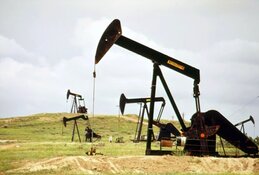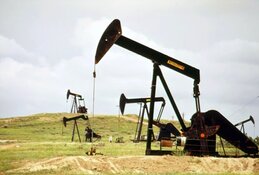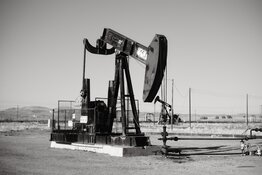strong>The Energy Report: Last week German Chancellor Angela Merkel said the euro was in trouble and that the EU needed an orderly means of dealing with the insolvency of its members. Germany even banned naked short selling. Are Europe's debt issues affecting the drop in the oil price?
Philip Weiss: From a fundamentals standpoint, with the weakness in the European economy, they're certainly not expected to use more oil right now. The weakness in the euro, combined with strength in the dollar, is having some effect. However, we think other factors are weighing more heavily on oil prices. There are stories out of China about them trying to slow things down a little bit. China is viewed as one of the drivers of demand growth; slower growth could have a material demand impact. U.S. consumption, although it has improved, is still down from its highs of a couple of years ago. We could say that this is just a supply-and-demand story and that right now demand is down.
TER: Do you see a further decline in the oil price in the coming months?
PW: My view has been for a while, and I think I have been in the minority on this, that I expected oil prices to go down as the year went on. I thought the oil price would have a higher average in the first half of the year versus the second; the only news to me is that this is a little earlier than I had expected. I guess I am just not convinced that the recovery is as strong as some people think or hope. Our forecast for oil for the year is an average of $75, but if I look at how I'm modeling prices, I go from a little over an $80 average in the second quarter down to an average of about $73 in the fourth quarter. My average is in that mid-$70 range for the second half of the year.
TER: How far in advance do you do your modeling?
PW: As far as publishing it, we only do the current year plus one more. I model out a little bit longer than that. Right now, I am publishing estimates for 2010 and 2011.
TER: What are you using for 2011?
PW: For 2011 we're using an oil price average of $85. I have oil prices getting a little bit lower in the first quarter of next year and then progressively moving higher as the year goes on.
TER: What are some of the supply-and-demand fundamentals that make you believe the oil price is going to average above $80 next year?
PW: Right now we have a lot of excess supply and news about economic weakness, which is why I am forecasting a lower price for the second half of the year. But I am anticipating that going into the second part of next year, the economy starts to move onto firmer ground. As that economic outlook improves, the demand for oil should increase, and then the tightness between supply and demand should start to narrow a little.
TER: How do you see the Gulf of Mexico oil spill affecting the oil price?
PW: In the short term, I don't think it has a lot of impact because so far there have not been stories coming out about a big impact on current production. I think the impact could depend on how long this continues and how long it takes for clean-up efforts—I am also talking about the investigation into what caused the spill. I expect we're going to come out of this with increased costs of doing business there, and then there's the moratorium on new drilling as well as how long it takes to implement any changes that may be made in terms of improving the safety of drilling going forward. I read a story today that Exxon Mobil (NYSE:XOM) had a project it was getting ready to do some work on, but it's being held up now. Those kinds of things have an impact; projects that were supposed to come on-line that could now be delayed. It's more of a longer-term potential concern than it is a short-term one. I would also note that the Gulf is the source of nearly 30% of current U.S. oil supply and more than 10% of U.S. natural gas supply.
TER: The oil spill is a crisis, and often in these types of situations opportunities arise. Do you see some investment opportunities as a result of the Gulf spill?
PW: Before this spill, I thought that there were more opportunities in the integrated oil company space than anywhere else. BP (NYSE:BP; LSE:BP), Transocean Ltd. (NYSE:RIG; SIX:RIGN) and Anadarko Petroleum (NYSE:APC) have all been hit the most, and Halliburton Co. (NYSE:HAL) has been hit pretty hard, too. The rest of the sector has been hurt by the combination of the potential impact of this incident on the industry, as well as the fall in the oil price.
I believe that in some ways BP was the unfortunate victim here. If you looked at any one of these big companies, it could have happened to any of them. BP happened to be the one that was in charge of this well. While there have been some instances where others have said their practices are safer, better, etc., than those of BP, for the most part there has not been much finger pointing beyond that done by the various companies directly associated with the blown-out well. Of the companies that I've talked to, nobody had in place a plan to deal with a disaster like this. If they had, somebody would have come forth, because this is not just a company-specific issue, it's an industry issue.
TER: But in terms of investment opportunities, do you see some undervalued companies with projects in the Gulf or do you see more opportunities in onshore plays that provide more stability?
PW: One company I think has excellent timing without necessarily trying to is Devon Energy (NYSE:DVN), because Devon sold its Gulf of Mexico properties to BP, and has already closed on the deal. They've sold out of their deep-water assets, and now they're focusing on onshore. I think if Devon put those deepwater assets on the market today, it is unlikely that it would get the same price that it did. I think that there is opportunity for Devon given that it's now just an onshore play.
I was at Occidental Petroleum Corp's (NYSE:OXY) analyst meeting yesterday, and Occidental has very little offshore exposure; none at all in the deep water. The news it had about its California shale positions and the potential production from those makes Occidental an interesting play. ConocoPhillips (NYSE:COP) is another company I like right now. Although it has a couple of Gulf projects—I think it has three in all—it doesn't have a lot of exposure in the deep water either. Those are three companies that I like that are less associated with the deep water.
TER: What's your target price on Devon?
PW: It's $76.
TER: ConocoPhilips?
PW: $72.
TER: Occidental?
PW: Occidental is $95.
TER: Do you see any promising plays in the Bakken Shales or maybe the oil sands?
PW: I don't really cover companies with tremendous exposure to the Bakkens. Hess Corp. (NYSE: HES) and Marathon Oil Corp. (NYSE: MRO) have some acreage and production there, but it's not very material to their overall production base. In the oil sands, Devon has exposure. BP has some exposure there; Exxon has some exposure and so does Royal Dutch Shell Plc. (NYSE: RDS.B). Even Marathon has exposure to the oil sands. But those are parts of their business, not a dominant piece. My coverage is generally on the larger side, so I don't cover companies that are somewhat focused on the oil sands. Devon has the largest exposure to the oil sands of the companies that I cover.
TER: You have a hold recommendation on Anadarko Petroleum. It had a really strong third quarter; revenue was up 31%. That's a Gulf player. What's your thinking there?
PW: My hold on Anadarko is a little bit different than my typical hold because I have a tough time recommending that investors put a lot of new money into companies involved in the Macondo incident because we don't know the ultimate cost to any of these companies. I think we're just trying to guess what the damage is going to be. Although Anadarko had some protection through insurance, I don't think it's going to be nearly enough to cover its whole liability. I am concerned about where it sits relative to this incident. Therefore, I think the most prudent course to take on Anadarko is just to sit tight.
TER: What is Anadarko's exposure as it pertains to the spill?
PW: Anadarko has a 25% interest in Macondo and that means it has a responsibility to cover 25% of the cleanup cost. In Anadarko's first quarter conference call, management said that if they had to come up with additional money to cover its liability, there are assets they could sell. They don't necessarily want to go to the securities market or the debt market to fund any liability, but they could sell an interest in some of their projects or sell some assets to cover their liability.
That's another unknown with Anadarko that makes me hesitant to recommend buying it at this point.
TER: What sort of opportunities do you see among the biggest of the big players—the Chevrons, the Exxons—those sorts of companies?
PW: I think there's opportunity in Exxon. I have a $90 target price on it. The stock has come down pretty sharply over the last few weeks. Traditionally, the stock has performed well when production is growing, and I expect Exxon to have higher production in 2010 than it did in 2009. A lot of the integrated oil companies in general have underperformed because of their exposure to refining, as the refining market has been so weak over the last year or two. But I do like Exxon because of its increasing production outlook.
Chevron Corp. (NYSE:CVX) is also a good opportunity. Chevron had great growth in 2009, but I expect less production growth in 2010. It has a good long-term growth profile; a lot of good projects out there. It has some exposure to the Gulf, but a lot of their other projects in areas like Australia relate to LNG (liquefied natural gas). Chevron probably has a little bit less exposure to the refining business than some of the other large integrateds because it has sold off some things. I have a $100 target on Chevron.
BP is kind of a similar story to Anadarko. Before the spill happened, BP was actually one of my top picks. But I downgraded it to "hold" about 10 days after the spill in the Gulf, and that's where it sits right now. There are too many uncertainties about what the ultimate outcome is going to be related to the spill.
TER: What about the next tier down in terms of market cap? Companies like Apache Corp. (NYSE:APA), Transocean?
PW: Transocean is pretty much the same story as BP and Anadarko; I downgraded Transocean at the same time that I downgraded BP because of the uncertainty around the Gulf incident. It was paid for its rig, as it has recovered the full insured value under its claim. The contracts are typically written so that service companies or rig companies like Transocean are insulated from environmental damage, but there has been governmental action taken against it because of Deepwater Horizon being a source of the spill. We don't know what its exposure is. There is too much uncertainty with Transocean, and it's not just because of the costs. It's also because these companies may have more trouble getting employees to work for them, and other companies to work with them.
I have a hold on Apache, though the price has come down a lot. It is looking more interesting; it is getting to a level where we have to think about whether or not to upgrade it. It is in the process of acquiring Mariner Energy Inc. (NYSE:ME), which provides its first exposure to deep water drilling in the Gulf. That does provide a little bit more risk for Apache. It's a really well-managed company; it has a really good cost structure, and it has some interesting projects in places like Canada, where it has a lot of shale exposure in the Horn River, in Egypt, and in Australia. Those are three areas where it has a lot of organic growth opportunities. Apache had a couple of projects come online in Australia in the first quarter that will help its oil production very nicely.
TER: Do you see more opportunity in natural gas than oil or vice-versa?
PW: I get asked that question a lot, and it's funny because when I look at my natural gas outlook―long term I love natural gas; I think it's a really good place to be. Short term, I see more pain for natural gas; we've probably had a lot more drilling than we should and a lot more production than we should. When you look at the pricing and cost structure, a lot of production doesn't seem to be economic. What's happening is we have companies hedging to protect their revenue stream. We have a lot of companies that have to drill because their leases are HBP leases—which means they are Held by Production—so that they have to drill against production in order to protect their leases. We have also had the willingness of a lot of banks and other investors to finance these companies so that they are able to essentially be in a deficit spending mode. The point was raised at Occidental Petroleum's meeting yesterday. Oxy has cut back a lot on its natural gas drilling because of pricing. And management was of the opinion that if prices got above even $5 or $6, then they could start to increase natural gas drilling activity. And the question was, "Well, if that's what you think and everybody else takes the same view, don't we end up right in the same spot?" And the answer is, "Well, yeah, we could, but we have to hope that you guys—meaning the investment banks, I don't work for an investment bank, I'm independent—were to stop funding some of this activity, that would help."
I think a lot of the companies that are natural gas focused are still priced too high for this environment. They foresee the scenario getting better sooner than I see it happening.
TER: You talked about how you liked natural gas in the long term. Is there a way to play this sector that would take advantage of your thesis?
PW: In the past I thought about using ETFs, kind of a pair trade with the USO (an oil ETF) and UNG (a natural gas ETF), but the concern that I have with those as a way to play this is that the ETFs are typically buying one-month futures contracts to make their investment, and when the month ends, they often end up taking a loss on the current month's contract and then buying the next month's contract at a higher price. I.e., the market is in what's called contango, as the price curve is upward sloping. As a result, these ETFs typically underperform the actual commodity. I no longer feel as comfortable using ETFs as a proxy for the market.
TER: Is there another way to play it other than ETFs?
PW: What I typically tell people is that instead of looking at one of the producers, look at one of the rig companies. Even though I have it as a "hold," I still tell them to look at a company like Helmerich & Payne (NYSE:HP). Based on everything that I know and what I hear from everybody that I've talked to, Helmerich & Payne FlexRigs are the best rigs out there for horizontal drilling. Horizontal drilling is a key to the success of these shale plays; it's really what made it economic. You can lower your drilling costs pretty dramatically by using HP's rigs. While HP charges premium day rates, using its rigs can reduce drilling times, and the efficiency gains typically can more than offset the impact of the higher day rate. HP is just starting to get a toehold in the international market, and it's got a really good position in the U.S. It's added more than 30 first-time FlexRig users to its customer base since the market bottomed. Generally, customers that work with HP stay with HP.
TER: Do you see yourself lifting the hold rating?
PW: It is kind of in the Apache camp right now where the price has fallen and we have to think about whether or not it's time to upgrade it. But I have not yet, so it is still a "hold."
Phil is a senior analyst covering the energy sector. Prior to joining Argus, Phil worked as a senior institutional writer for T. Rowe Price where he wrote commentary for several of the firm's investment strategies and white papers on investment-related topics. He also worked as a writer/analyst/co-portfolio manager for The Motley Fool's Cash King/Rule Maker Portfolio. While there, he primarily wrote company-focused reports and columns discussing accounting/financial/earnings manipulation. Phil started his career with Deloitte & Touche where he specialized in international tax research and planning, and subsequently worked for Fortune 500 firms in the healthcare and business-to-business industries. Phil has a Bachelor of Science degree from Rutgers University. He is a CFA charterholder, is a CPA in the state of New Jersey and is also a member of the Baltimore Society of Security Analysts.
Want to read more exclusive Energy Report interviews like this? Sign up for our free e-newsletter, and you'll learn when new articles have been published. To see a list of recent interviews with industry analysts and commentators, visit our Expert Insights page.
DISCLOSURE:
1) Brian Sylvester of The Energy Report conducted this interview. personally and/or his family own shares of the following companies mentioned in this interview: None.
2) The following companies mentioned in the interview are sponsors of The Gold Report or The Energy Report: Transocean and Royal Dutch Shell.
3) Philip Weiss: I personally and/or my family own shares of the following companies mentioned in this interview: BP, HP, RIG. I personally and/or my family are paid by the following companies: None.
TICKERS: , APA, BP, CVX, COP, DVN, XOM, HAL, HP, HES, ME, OXY, SHEL; SHELL, RIG; RIGN
Phil Weiss: Best Advice? Integrated Oil Co's
Interview
Source: Brian Sylvester of The Energy Report (6/8/10)
 The economic recovery that will drive up oil prices is still at least a year away, says Argus Research senior analyst Philip Weiss in this exclusive interview with The Energy Report. He generally favors the sector's big players, but you will have to keep reading to find out which ones make Phil's cut.
The economic recovery that will drive up oil prices is still at least a year away, says Argus Research senior analyst Philip Weiss in this exclusive interview with The Energy Report. He generally favors the sector's big players, but you will have to keep reading to find out which ones make Phil's cut.








































